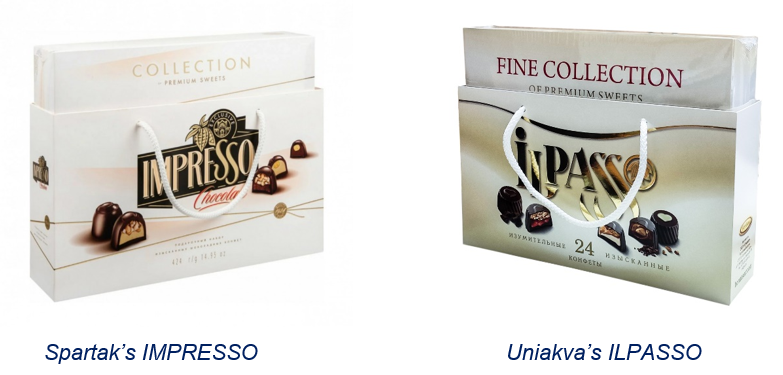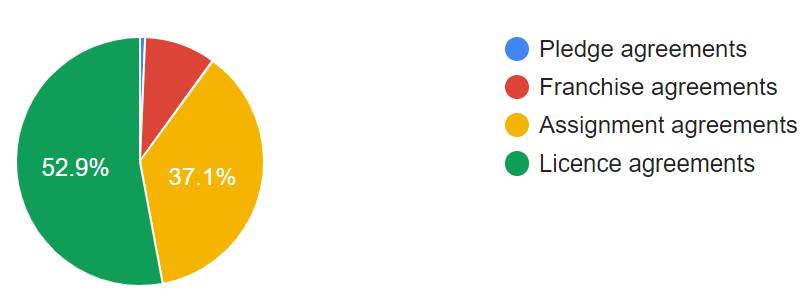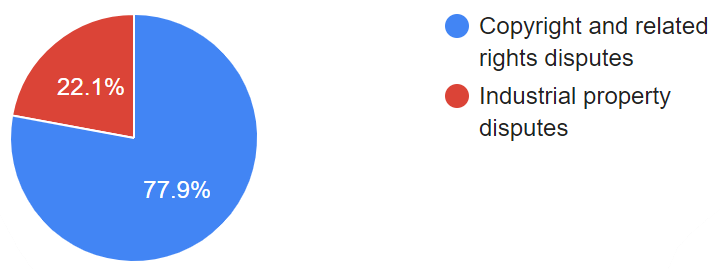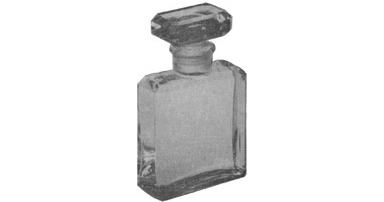Our intellectual property (IP) team will share with you some interesting statistics about the intellectual property market and inform you about the main changes in legislation in Belarus and the Baltic States. Our experts will also talk about high-profile disputes, analyse some cases regarding the registration of trademarks, and draw conclusions that will help our readers to avoid situations of this kind in their practice.
IP news from Belarus
IMPRESSO vs. ILPASSO: confectioners battle over unfair competition
The dispute involved two confectionery brands: Spartak, the largest confectionery manufacturers in Belarus, and the Belarusian company Uniakva. The battle started when Spartak spotted sweets bearing the ILPASSO mark produced by the company Uniakva, which looked similar to Spartak’s IMPRESSO sweets:

In February 2020 Spartak applied to the Belarusian antimonopoly authority. It invoked a relatively new article of Belarusian competition law which prohibits unfair competition by copying and imitating the appearance of goods: their packaging, labels, names or colours, among other things.
After an investigation lasting almost a year, the Belarus antimonopoly authority found that Uniakva’s actions constituted unfair competition. Different measures were taken during the investigation to prove unfair competition, including a public survey. Uniakva was ordered to cease selling ILPASSO sweets in packaging similar to IMPRESSO sweets, and withdraw unsold stock from the market.
Uniakva tried to appeal the decision of the antimonopoly authority and filed a complaint with the Belarus Supreme Court; however, this was rejected in February 2021.
Recent IP developments at the EAEU level
This piece of news concerns IP protection at the level of the Eurasian Economic Union, covering its all member states (Armenia, Belarus, Kazakhstan, Kyrgyzstan and Russia).
Firstly, on 4 January 2021 the Law on Ratification of the Treaty on EAEU Trademarks was adopted. This is another step towards the prospect of obtaining a trademark registration covering all EAEU member-states. It is expected to be similar to other “regional” trademarks such as EU trademarks. The treaty is aimed to simplify and speed up the procedure of obtaining legal protection of trademarks throughout the EAEU, reduce related costs and ensure free movement of goods within the EAEU market.
Secondly, on 1 March 2021 the Eurasian Patent Organisation (EAPO) launched a new informational resource – the EAPO Pharmaceutical Register (available via link in Russian). This register contains information on Eurasian patents on pharmacologically active substances, including pharmaceuticals.
The Pharmaceutical Register contains up-to-date information on the legal status of Eurasian patents, including data about validity terms, rights holders, registered licensing agreements, etc. So starting from 1 March 2021, holders of Eurasian patents may apply to the EAPO with a request for their patent to be included in the EAPO Pharmaceutical Register.
Key figures in the Belarusian IP market in 2020
In total, in 2020, the patent authority received 1,034 applications for registrations of patents/certificates related to inventions, utility models, industrial designs, plant varieties and integrated circuit topologies.

Nonetheless, trademarks have proved to be the most popular registered IP in Belarus – 8,544 applications were submitted in 2020.
In 2020 the total number of IP-related agreements registered by the Belarusian patent authority was 588, 24.5% less than in 2019. These agreements include licences, assignments, franchises and pledges.

In 2020, 249 cases were considered by the Belarusian Supreme Court, which is 2.5% more than in 2019. See the chart below, where they are divided by topic.

Finally, there are also some highlights regarding administrative and criminal proceedings related to intellectual property:
- As to administrative proceedings, in 2020, the Belarusian customs authorities prosecuted over 60 counterfeit cases. The counterfeited items were mostly sports shoes, all-terrain vehicles, toys and spare car parts. The majority of counterfeited items come from the United States, Lithuania and Russia.
- As to criminal proceedings, in January 2021 a criminal case was initiated with regard to the import and sale of counterfeit low-quality butter from Russia. This counterfeit weighing over 5.7 tons contained trademarks of famous Belarus manufacturers.
IP news in Lithuania
Legendary Chanel perfume bottle does not have distinctive character, according to the State Patent Bureau
The dispute started back in 2016, when the State Patent Bureau refused to register a perfume bottle as a trademark due to its lack of a distinctive character and the fact that it consisted solely of a shape determined by the nature of the goods themselves.

Chanel SARL argued that the sign was distinguished by its square-cut glass vial with sloping edges, and characterised by its fine lines and modernist simplicity, wide shoulders, narrow round neck and octagonal stopper.
After appeals to the State Patent Bureau and proceedings before the court of first instance, on 11 February 2021, the Lithuanian Court of Appeal determined that due to its use in combination with other marks, the bottle alone is not sufficient for the origin of the goods to be distinguished.
Chanel tried to rely on a survey demonstrating the sign had acquired distinctiveness, but the court rejected the evidence as the survey was carried out in France and not among the Lithuanian public.
QUORA and Qoorio allowed to co-exist
The State Patent Bureau granted the registration of HumansApp sign “Qoorio”, which was opposed by Quora, Inc. due to its similarity to their trademark “QUORA”.
![]()
![]()
The State Patent Bureau found that the contested sign ‘Qoorio’ will be perceived as an artificial word and found no phonetic similarity, as when the two words are divided into syllables, they become “QUO-RA” and “Qoo-ri-o”, and so the individual syllables are different. The individual syllables of both trademarks were found to have no meaning, so a semantic comparison was not even required.
Since no similarity between the compared signs was established, the determination of the identity or similarity of the services (even though in this case, according to the Nice classification, the services did partially coincide) had no legal significance in the present dispute.
IP news in Latvia
Decision of the Industrial Property Board of Appeal prohibits the registration of trademark “SS”
On 24 November 2020 the Industrial Property Board of Appeal adopted the decision to leave in force the Patent Office’s decision rejecting the registration of the trademark “SS”, which was filed by a Latvian company which owned a website on which private advertisements were posted (Applicant).
Registration was applied for the trademark under Nice Class 35 – internet advertisements. It was a word mark, and it did not consist of any additional graphic elements. The registration was rejected on the basis of it being contrary to public order and moral principle.
The Board of Appeal agreed with the argumentation of the Patent Office, stating that one interpretation of the designation “SS” is related to the World War II Nazi German organisation “Schutz-Staffel”. This was a military organisation and was responsible for terror against opponents of the Nazi regime and against Jews, and for guarding the concentration camps. This organisation as well as its past activities was declared criminal by the Nuremberg Tribunal.
The Patent Office based its argument on the fact that the events of World War II are still a common topic of public discussion and historical research. Therefore, the previously mentioned meaning of the designation “SS” would be recognised not only by those who have suffered from this organisation’s activities or were involved in World War II, but also by most of the general public with television and internet access.
The public use of symbols and designations of the Nazi regime is generally prohibited under the law of Latvia, with the only exception being for educational purposes related to the history of World War II. Thus, the registration of a trademark that is contrary to public order cannot be permitted.
The Applicant explained that it had already been using the trademark “SS” in its business activity for a significant period of time and had not received any complaints, either from the state authorities or from private individuals. However, the use of the designation in business activity itself does not affect the Patent Office’s assessment on whether such a designation would conflict with the values of society and the public relations of the state.
Since the mark was contrary to public order and moral principles, the Patent Office’s decision was left in force and the registration of the trademark was rejected.
What can we learn from this case?
Only designations which are not contrary to public order can be registered as trademarks. Even if the designation has been used as a company name or in practice, and serves the purposes of a trademark while being unregistered, this does not prevent it from the risk of unregistrability on the grounds of having negative connotations among the public. Choosing a name for a company and any of its offered goods or services must be done cautiously as it may have an impact when filing an application for trademark registration. It remains an open question whether the Patent Offices’s assessment would have been the same if the mark had also featured graphical or other distinguishing elements.
The use of Indications of Geographical Origin requires a certain level of public recognition of the company
On 2 February 2021 the Industrial Property Board of Appeal adopted a decision leaving in force the Patent Office’s decision rejecting the registration of the trademark “Jūrmala beer” (“Jūrmalas alus” in Latvian), which incorporated the name of a city in Latvia, Jūrmala.
The application was filed by a Latvian company specialising in beer production and established in 2019 (Applicant). Registration was applied for the trademark under Nice Class 32 – beer. It was a word mark, and it did not consist of any additional graphical elements.
The Patent Office based its decision on previous statements by the Court of Justice of the European Union. It concluded that for a trademark to have sufficient distinctiveness, it must identify the origin of the goods from a specific company and give consumers the opportunity to distinguish the goods from others of a similar kind. The criteria of distinctiveness should be based not only on the distinctiveness of the trademark in relation to its protected goods and services, but also on the perspective of consumers.
A significant role in this case was played by the detail that the city name “Jūrmala” literally translates as “seaside” in the Latvian language. The Applicant based its appeal against the Patent Office’s decision on the fact that it had not intended the trademark to be interpreted in relation to the city of Jūrmala. Instead, it was to be interpreted as “seaside beer”. However, the Patent Office and the Board of Appeal ruled that the word “Jūrmala” would be clearly interpreted as an indication of geographical origin – as the name of the city of Jūrmala. This would lead consumers to expect this beer to have been brewed in Jūrmala.
According to the Board of Appeal, if the Applicant had intended to name the beer after a sea-related landscape, the trademark could have been named in a more imaginative manner. Firstly, the language provides plenty of opportunities to name the trademark differently while preserving its underlying idea. Secondly, these difficulties could have been avoided if the trademark had been figurative and contained some graphical elements.
The Applicant also argued that there are already different companies producing beer and other goods that use indications of geographical origin in their trademarks. However, as pointed out by the Board of Appeal, all of these companies had been operating for several years and already had a high level of recognition from the majority of the public before registering these trademarks. Thus, the risks of confusion on the part of customers was minimal.
Furthermore, when assessing whether to allow the use of an indication of geographical origin as a trademark, the Patent Office always considers the possible number of persons potentially interested in providing the same kind of goods and services in the geographical area in question. The bigger or more populated the area, the higher the potential number of persons interested in using this indication of geographical origin. Thus, a trademark incorporating the name of a smaller and less populated area has a better chance of success. However, Jūrmala is a city with a population of 50,000 and is located near Riga, the capital of Latvia. Therefore, this criterion could not be applied in this case.
Based on the aforementioned details, the Patent Office’s decision was left in force and the registration of the trademark was rejected.
What can we learn from this case?
Not only negative connotations, but also unexpected similarities with indications of geographical origin or other publicly well-known designations can serve as grounds for refusal of registration. If the trademark needs to involve an indication of geographical origin, it is recommended to choose a name that is less well-known to the general public. The risks of refusal on the grounds previously mentioned are lower if the trademark is figurative.
IP news in Estonia
Estonia extending and raising “blank media tax”
The long-awaited update to the Estonian private copying levy regulation has now entered into force. The private copying levy is paid by consumers when purchasing recording or storage media and is meant to ensure fair compensation to authors for acts of private copying of their works. Most importantly, the new levy system:
- includes smartphones, laptops, tablets and external storage devices such as USB flash drives and memory cards as products subject to the levy, and sets levy amounts per device/media carrier:
| Recording device or media carrier | Levy per device/media carrier |
| Laptop or tablet | EUR 3.50 |
| Desktop computer | EUR 3.50 |
| Smartphone, phone with MP3/MP4 player | EUR 3.50 |
| TV with a recording function | EUR 4 |
| Audio or video recording device for optical media carriers, other than one integrated in a computer |
EUR 3 |
| MP3/MP4 player with internal memory | EUR 3 |
| External hard drive | EUR 3 |
| USD flash drive | EUR 0.50 |
| Memory card | EUR 0.50 |
| Optical media – without a recording function | EUR 0.03 |
- delegates the determination of the levy amounts to the Government, in order to make the levy mechanism more flexible and facilitate future changes;
- includes producers of first versions of films in the list of parties eligible for remuneration (the list currently includes authors, performers and producers of phonograms).
The debtors remain the same: manufacturers, importers, sellers and intra-EU importers of storage media and recording devices are considered debtors. The sellers are held liable for payment in cases where the manufacturer, importer or intra-EU importer has not paid levies.
Levies are reimbursed when covered products are used in the course of the business activities specified in the articles of association of the undertaking.
An update to the Estonian private copying levy had been heavily debated, as the list of levied products was last updated in 2006. The Estonian Supreme Court had also previously acknowledged the need to amend the law, as multiple court proceedings had been initiated with the aim of awarding collective management organisations compensation for inadequate private copying levy legislation.
Rights to Facebook pages can only be managed by natural persons, according to Estonian courts
In a dispute over ownership rights of a Facebook page, Estonian courts concluded that rights to Facebook pages can only be managed by natural persons, not by legal entities. In essence, claims concerning Facebook pages must be directed against the natural persons managing them, even if the Facebook page is run in the interests of and maintained under the control of a legal entity.
In a case concerning the infringement of various IP rights, the claimant alleged that the defendant, a legal entity, had deprived the claimant access to a Facebook page the claimant had created at its own expense and initiative. The defendant had taken over the Facebook page and displayed content belonging to the claimant on the page.
The court drew attention to the fact that only a natural person can open a Facebook account and run a Facebook page. Page administrator rights can thus only be exercised by a natural person who has a Facebook account and not by a legal entity. In order to claim the rights to a Facebook page, a claim must thus be aimed at the natural person in control of the page. This means companies should pay closer attention to regulating social media account rights in relevant employment contracts.
Estonian Patent Office gains new powers
The Estonian Patent Office has gained new powers, taking over certain functions in the field of copyright and related rights from the Ministry of Justice. Most importantly, the Estonian Patent Office will now exercise supervision over collective management organisations and organise the work of the Copyright Committee tasked with monitoring compliance of the level of protection of copyright and related rights, and resolving disputes related to copyright and related rights by way of conciliation of the parties, among other means.
The Estonian Patent Office is set to become a modern competence centre of intellectual property rights, advising entrepreneurs on intellectual property issues and raising awareness about protection of copyright and related rights, in addition to ensuring a fast and effective procedure for registering intellectual property rights and fast pre-trial resolution of disputes.
Estonian “Sõir” to become a geographical indication
Estonia’s second geographical indication, “Sõir”, has been confirmed by the European Council, and was published in the Official Journal of the European Union on 09.02.2021. Opposition can be filed for up to three months after publication.
“Sõir” is an Estonian quark cheese made of milk, quark – a.k.a. fresh or curd cheese – butter, eggs, salt, and caraway seeds. “Sõir” originates from Setomaa in south Estonia. If it successfully passes the period of opposition , “Sõir” will become Estonia’s second geographical indication, the first being “Estonian vodka”, which was registered in 2008.
The registration of a geographical indication indicates that the product carrying the indication originates from a specific area and has characteristics that are due to its geographical origin. In order for a product to carry a geographical indication, at least one of the production stages must take place in the defined geographical area. Trademark applicants also need to be aware of the fact that there may be obstacles to the registration of trademarks including names of geographical locations, and need to take this into account.
You can find out more about our intellectual property service and experience in handling cases.


